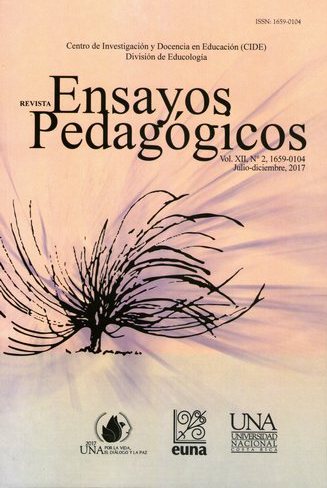Analysis of Administrative Management in Costa Rican Educational Institutions: Perceptions of Teachers and Principals
DOI:
https://doi.org/10.15359/rep.12-2.5Keywords:
educational administration, administrative management, organization of schools, educationAbstract
Educational institutions, as complex and dynamic organizations, are characterized by the social processes that lead them to the accomplishment of goals and common objectives. Regarding this matter, administrative management has the challenge of favoring pertinent alternatives for every context offering answers to the necessities and interests of the educational community and, at the same time, of being responsive for the administrative structure of the system of which it is a part. This study has the objective of analyzing both the teaching staff and the management´s perception about administrative management. The methodology used for the accomplishment of the objectives arises from a mixed approach, specifically from a quantitative perspective through a non-experimental transversal design, while the qualitative approach is based on a phenomenological method. Data recollection was done whit an ad hoc questionnaire applied to 192 teachers and semi structured interviews conducted to six Costa Rican public school managers. Results show that there is some lake of knowledge by the teaching staff on the functions inherent in the administrative management; likewise, there are relevant aspects regarding the guidelines emanated from the Ministry of Public Education in response to the needs of the context, infrastructure and economic resources destined by the Costa Rican State as means to support teaching as well as teachers participation in the school activities.
References
Aguas, C. A. G., Fernández, E. D. C. G. y Cantillo, L. P. H. (2013). Procesos de planeación y organización en la institución educativa técnica industrial Antonio Prieto. Jornada matinal de la ciudad de Sincelejo en 2011-029. Revista Pensamiento Gerencial. Recuperado de http://revistas.unisucre.edu.co/index.php/rpg/article/view/82
Bisquerra, R. (coord.). (2014). Metodología de la investigación educativa. Madrid, España: Editorial La Muralla.
Bolívar, A., López, J. y Murillo, F. J. (2013). Liderazgo en las instituciones educativas. Una revisión de líneas de investigación. Recuperado de https://idus.us.es/xmlui/handle/11441/33743
Borrell, E. y Chavarría, X. (2001). La planificación y autoevaluación del trabajo de los directivos de centros docentes. Monografías de Escuela Española. Barcelona, España: CISS-PRAXIS-Educación.
Botía, A. B. (2013). Cambio y liderazgo educativo en tiempos de crisis. In Organización y gestión educativa. Revista del Fórum Europeo de Administradores de la Educación (Vol. 21, No. 4, pp. 14-17). Ciss Praxis. Recuperado de https://dialnet.unirioja.es/servlet/articulo?codigo=4298483
Cenich, G. y Santos, G. (2015). Aprendizaje significativo y colaborativo en un curso online de formación docente. Revista electrónica de investigación en educación en ciencias, 4(2). Recuperado de http://ppct.caicyt.gov.ar/index.php/reiec/article/view/7386
Chiavenato, I. (2006). Introducción a la Teoría General de la Administración. Sétima edición. México: Mc Graw-Hill.
Chica, C. A. B. (2015). Cinco tendencias de la gestión educativa. Revista Politécnica, 3(5), 19-31. Recuperado de http://www.plagioplus.com/index.php/pol/article/view/71
Cohen, L. y Manion, L. (1990). Métodos de investigación educativa. Madrid: La Muralla.
Contreras, F. y Barbosa, D. (2013). Del liderazgo transaccional al liderazgo transformacional: implicaciones para el cambio organizacional. Revista virtual universidad católica del norte, 2(39), 152-164. Recuperado de: http://revistavirtual.ucn.edu.co/index.php/RevistaUCN/article/view/433
Covey, S. (1997). El liderazgo centrado en principios. España: PAIDOS.
Creswell, J. W. (2009). Research Design: qualitative, quantitative, and mixed methods approaches (3rd ed.). London: Sage.
Cronbach, L. J. (1951). Coefficiente alfa and the internal structures of tests [Coeficiente Alfa y estructura interna de los test]. Psychometrika, 16(3), 297-334. Recuperado de http://psych.colorado.edu/~carey/courses/psyc5112/readings/alpha_cronbach.pdf
Fernández, J. M. y Hernández, A. (2013). Liderazgo directivo e inclusión educativa: Estudio de casos. Perfiles educativos, 35(142), 27-41. Recuperado de http://www.scielo.org.mx/scielo.php?script=sci_arttext&pid=S0185-26982013000400003
Hernández, R, Fernández, C y Baptista, P. (2010). Metodología de la investigación. México, D.F: Mc Graw Hill.
López, A. Y. G., Álvarez, A. G. y Ocampo, H. F. P. (2014). El impacto de la formación docente en el rendimiento académico del estudiante. El caso de la Universidad Autónoma de Nayarit. Inclusión con Responsabilidad-Tomo III, 7. Recuperado de http://s3.amazonaws.com/academia.edu.documents/38880625/INCLUSION_CON_RESPONSABILIDAD_III.pdf?AWSAccessKeyId=AKIAJ56TQJRTWSMTNPEA&Expires=1476913615&Signature=CKdpcWBjPw6PXeTO3DFxLCC5kXQ%3D&response-content-disposition=inline%3B%20filename%3DInclusion_con_responsabilidad.pdf#page=7
López-Yáñez, J., García-Jiménez, E., Oliva-Rodríguez, N., Moreta-Jurado, B. y Bellerín, A. (2016). El liderazgo escolar a través del análisis de la actividad diaria de los directores. REICE. Revista Iberoamericana sobre Calidad, Eficacia y Cambio en Educación, 12(5). Recuperado de https://revistas.uam.es/index.php/reice/article/view/2828
Macluf, J. E., Beltrán, L. A. D. y Chávez, R. M. A. (2015). El desarrollo organizacional y la resistencia al cambio en las organizaciones. Ciencia Administrativa, 1, 1-9. Recuperado de http://revistas.uv.mx/index.php/cadmiva/article/view/1604
Ministerio de Educación Pública. (2012) Dirección de Gestión y Evaluación de la Calidad. Glosario de la Educación (1ª ed). San José, Costa Rica: MEP.
Molano, A. D. (2016). La gestión educativa: Hacia la optimización de la formación docente en la educación superior en Colombia. Sophia, 12(1), 55-70.
Palacios, J. A. D. (2013). Calidad educativa: un análisis sobre la acomodación de los sistemas de gestión de la calidad empresarial a la valoración en educación. Tendencias pedagógicas, 21, 177-194. Recuperado de https://dialnet.unirioja.es/servlet/articulo?codigo=4183206
Ramón, M. R. R. y Medina, C. P. (2014). La formación en competencias básicas: un reto para la administración. Profesorado: Revista de curriculum y formación del profesorado, 18(2), 245-265. Recuperado de http://www.ugr.es/~recfpro/rev182COL6.pdf
Serrano, J. S. C. S. (2015). Evolución de la Administración y la Gestión Escolar. Tendencias Pedagógicas, 14, 159-168. Recuperado de https://revistas.uam.es/tendenciaspedagogicas/article/view/1910/0
Downloads
Published
How to Cite
Issue
Section
License
Ensayos Pedagógicos is subscribed to the Attribution-NonCommertial-NoDerivatives 4.0 International Creative Commons Licence, which allows both authors and readers to freely download, store, copy, and distribute the final approved publisehd version of the manuscript (post-print) as long as this is done without commercial purposes, no derivative works are generated, and the source and author are mentioned. As well, Ensayos Pedagógicos declares that authors will remain the rightful owners of the copyrights of their work in perpetuity.







